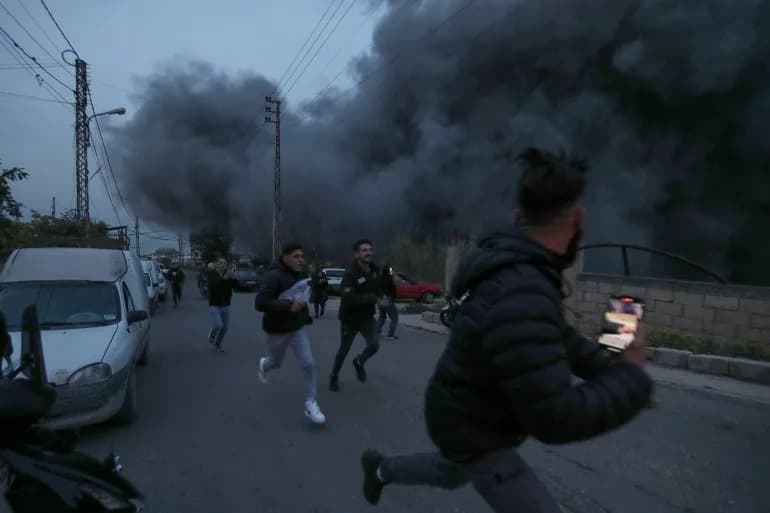An Israeli air strike in Burj Rahal, southern Lebanon, killed one person and wounded another, striking near a school and causing panic, authorities said. The attack is the latest in a series of near‑daily strikes across southern Lebanon despite a ceasefire signed on November 27, 2024. Israeli and U.S. officials are pressing Lebanon to curb Hezbollah’s military capabilities, while Hezbollah denies efforts to rebuild and refuses to disarm. Residents in the Bekaa Valley and Baalbek report ongoing bombardment and growing fear of a renewed large‑scale conflict.
Israeli Air Strike in Burj Rahal Kills One, Fuels Fears of Renewed Conflict in Bekaa Valley

Strike in Tyre district wounds community and renews tensions
An Israeli air strike in the southern Lebanese town of Burj Rahal killed one person and wounded another on Wednesday, Lebanon’s Ministry of Public Health said, as cross‑border attacks continue despite a ceasefire agreed on November 27, 2024.
The ministry said an “Israeli enemy raid” hit a car in Burj Rahal in the Tyre district. Lebanon’s National News Agency reported the strike occurred near a school, triggering panic among students and prompting parents to rush to collect their children amid scenes of fear and confusion.
Context: ceasefire under strain
The Israeli military did not immediately comment on the incident. The strike was the latest in a series of near‑daily attacks across southern Lebanon, even though a ceasefire has been in place since late November. Israeli forces remain deployed in multiple locations in the south and say their operations target Hezbollah fighters and infrastructure.
Lebanon’s Health Ministry reported other recent deadly incidents in the south: earlier in the week two people were killed and seven wounded in separate attacks, and raids in Nabatieh reportedly killed four people.
Political and military tensions
Israeli and U.S. officials have been urging Beirut to pressure Hezbollah to disarm, arguing the group’s arsenal poses a threat to regional stability. Israeli military intelligence has claimed Hezbollah is attempting to rebuild its capabilities; Hezbollah spokespeople have denied those assertions and accused Israel of fabricating pretexts for attacks.
"Israel fabricates stories and claims to justify its attacks," a Hezbollah spokesperson told L'Orient Today.
Hezbollah officials maintain they will not disarm, arguing that surrendering their weapons would leave southern Lebanon vulnerable to further Israeli incursions.
Scenes from the Bekaa Valley
Nearly a year after a wide‑scale Israeli bombing campaign, residents of the eastern Bekaa Valley say they remain under persistent threat. In Baalbek — a city known for its Roman ruins and regarded as a Hezbollah stronghold — Israeli strikes continue to target what the Israeli military describes as the group's logistical and operational infrastructure. Civilians say they also suffer the consequences.
"What is happening now isn’t short of a war. It is a war," Abu Ali, a Baalbek resident, told Al Jazeera. Another resident, Ali Chokair, said talk of further strikes on Baalbek is forcing people from their homes.
Much of the Bekaa region remains scarred by last year’s strikes, leaving one of Lebanon’s poorest areas struggling to rebuild amid continuing insecurity and displacement.
Leaders respond
Israeli Prime Minister Benjamin Netanyahu warned that Israel would "act as necessary" if Lebanon did not ensure Hezbollah handed over its weapons, saying Israel would exercise its right of self‑defence under the terms of the ceasefire.
Lebanese leaders have spoken of the need to avoid a wider conflict and — while acknowledging difficult choices — face strong domestic opposition to any talks that would require Hezbollah to disarm. Local residents such as Hussein Osman, a Baalbek restaurateur who refused to evacuate during last year’s escalation, say they view weapons held by the group as protection for their communities.
"We would support any negotiation that works for the benefit of the resistance," Osman said. "But any negotiation that involves disarming the resistance is not accepted … These weapons protect us and allowed us to stay in our homes."
The situation remains fragile: isolated strikes and deployments continue to stoke fear of a wider confrontation, while political pressure from regional and international actors presses on Beirut to rein in armed groups operating on its soil.
Help us improve.




























